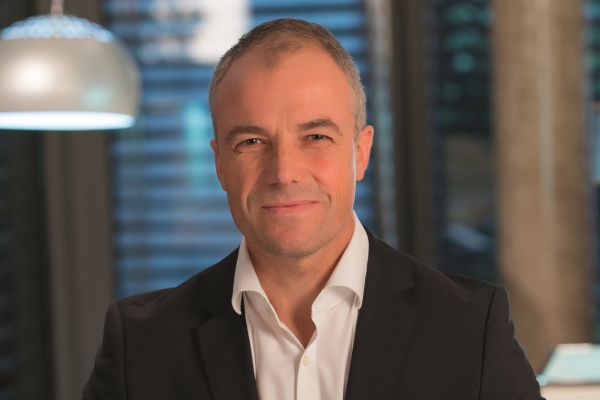 Vincent Gouverneur, EMEA Investment Management Leader at Deloitte;
Credit: Deloitte Luxembourg
Vincent Gouverneur, EMEA Investment Management Leader at Deloitte;
Credit: Deloitte Luxembourg
On Monday 20 June 2022, Deloitte Luxembourg and Deloitte Ireland jointly published their latest findings for trends affecting asset managers across both traditional and alternative investments in their 2022 Europe, the Middle East and Africa (EMEA) Asset Manager Survey.
With data collected from eleven asset managers with a combined €9.7 trillion in assets under management (AuM), the survey also reports on trends between asset managers who have more or less than €100 billion of AuM or who are managers of either liquid only or also illiquid products.
With consistent industry growth, the outlook for Asset Management is good; firms are seeking to grow their staff to manage data and compliance and to support expansion of Environmental, Social and Governance (ESG) and private debt product offerings. The global pandemic accelerated digitalisation and shifted ways of working, as investor interests continue to influence Asset Managers’ product offerings.
“Our survey respondents see the opportunities ahead for Asset Management,” said Vincent Gouverneur, EMEA Investment Management Leader at Deloitte. “So, too, are they clear-eyed about the potential challenges ahead, taking action to ensure they are responding to market changes and investor expectations.”
The Asset Management future looks bright
The survey shows that Asset Management in EMEA is strong with three successive years of increased revenue, due to new client acquisition and growth in net new money (NNM). For survey respondents who saw their revenues decrease, the investment market and performance were the cited cause. Meanwhile, hiring new staff was the main force driving cost increases, particularly for Asset Managers with less than €100 billion AuM.
“With such steady growth in revenue and clients, it’s no surprise that Asset Managers are looking to staff up in order to scale their business,” said Mr Gouverneur. “Although the survey shows some variance in proportional staff costs between smaller and larger Asset Managers, the refrain was clear: right-sizing staffing is on the minds of Europe’s Asset Managers. This is to be expected with the current backdrop of regulatory shifts across EMEA.”
In a trend first identified in 2019, Asset Managers expect investment strategies in private debt and ESG to increase the most in the next three years. Also on the horizon is the rise of allocations into real assets, which offer a wider range of investment products to clients. Infrastructure, commercial and residential real estate, and land are estimated to have the most demand in this category.
COVID-19 as a digitalisation driver
Like in so much of the business landscape, COVID-19 continues to send waves through the Asset Management industry. The pandemic catalysed changes in how Asset Managers conduct business, with 67% of respondents revising policies and ways of working and 44% ramping up digital capabilities or implementing new systems or technology to rapidly adapt. Only 30% of respondents shared difficulties associated with working remotely as a primary challenge throughout the pandemic.
“COVID-19 seems to have given the industry an unanticipated shove toward shaking up its more outdated working models and increasing its digital capacities,” said Mr Gouverneur. “Change can be difficult, but the Asset Managers surveyed felt mostly positive and reported higher productivity and increased employee satisfaction, in addition to accelerated digitalisation.”
According to the survey’s findings, the number-one focus of digitalisation for Asset Managers is improvement of internal processes. Asset Managers with higher AuM were more likely to focus on improving their digital investment management capabilities and to partner with FinTech companies.
Sustainable products steadily saturating the market
Adoption of ESG products shows no sign of slowing. With more than half of asset managers already offering sustainability-related funds, integration and exclusion appear to be the most popular strategies. Respondents reported they will be increasing their AuM Socially Responsible Investment (SRI) strategies by an average of 62% within the next three years.
“At this point, investors expect Asset Managers to have ESG products,” said mr Gouverneur. “And even though the regulatory landscape is still changing, Asset Managers recognize the opportunities associated with sustainable products.”
Turning data woes into data flows
In a decisive statement on the importance of managing data, 100% of respondents perform data management in house and indicated that asset data, market data, and ESG data were most important. Smaller players reported a greater need for innovation in regulatory technology, risk management and compliance.
“Even as data reliability improves, the respondents with lower AuM felt that using data remains expensive and not fully geared to their current working paradigm,” said Mr Gouverneur.
However, more than half (54%) of Asset Managers believed that their data was sufficient to support their business needs and also expected proportionally higher short-term revenue growth than those who didn’t.
The 2022 EMEA Asset Management Survey is available online via: https://www2.deloitte.com/lu/asset-management-survey.








